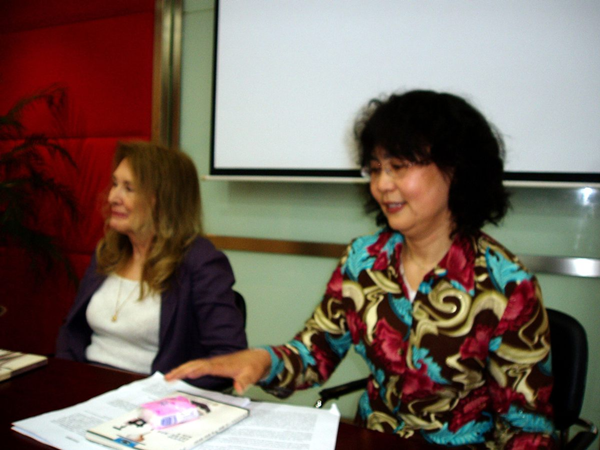Chinese translations see huge sales spike after author's Nobel win
(chinadaily.com.cn)| Updated : 2022-10-18
Print Print
Guo Yumei, right, meets with Annie Ernaux at an event held by the French Embassy in Beijing in 2005. [Photo provided to chinadaily.com.cn]
After French writer Annie Ernaux won the 2022 Nobel Prize in Literature earlier this month, the Chinese versions of her works A Woman's Story and La Place saw a surge in sales.
The publishing house Shanghai People's Press announced it will reprint the books, published in Chinese in 2003, and they are expected to hit the market later this month.
The translator of the novels, Guo Yumei, a professor in French language and translation at Tianjin Foreign Studies University, said her phone rang constantly after the announcement. Local readers expressed their appreciation for her work, and her introduction of Ernaux to China was hailed by her contemporaries and the press.
Commentators noted Guo has a deep insight into contemporary French literature, as she translated Poisson d'or in 2000, a book written by 2008 Nobel literature laureate Le Clezio.
Guo said as a teacher of French, translation benefits her teaching.
Her appreciation of Ernaux comes from the author's unique writing style in autofiction -- a genre heavily influenced by the life experience of the author.
"Ernaux wrote in 'first person' and exposed her experience through fiction… it seems like a paradox, but she has broken the wall," she said.
Upon invitation by the French embassy in 2005, Guo met Ernaux in Beijing in a seminar focusing on her book. Ernaux admitted her mother was "still alive", but in her books she wrote her mother "passed away".
In her writing, Ernaux examines a life marked by strong disparities regarding gender, language and class. Her path to authorship was long and arduous, the Swedish Academy said. Ernaux's work is "uncompromising and written in plain language, scraped clean", and when she reveals "the agony of the experience of class, describing shame, humiliation, jealousy or inability to see who you are, she has achieved something admirable and enduring", the academy said in the press release.
"Ernaux, born in 1940, belongs to the generation growing in and up after World War II," Guo said. "The founding of New China, also after wars including the War of Resistance against Japanese Aggression (1931-1945) and the War of Liberation (1946-1949), so readers and the writer share common ground. When I am translating, I can't help but cry. To a certain extent, I think she was writing my experience."
Sometimes she feels a "resonance" with Ernaux, she said. For example, "when she wrote scenes of her aged mother in a nursing home, I shared her agony as I also felt sorrow when seeing my mother was sick."
Along with the reprinting of Guo's translations, Ernaux's Mémoire de fille translated by Chen Shuting, another teacher at her university, is expected to hit the market this month.